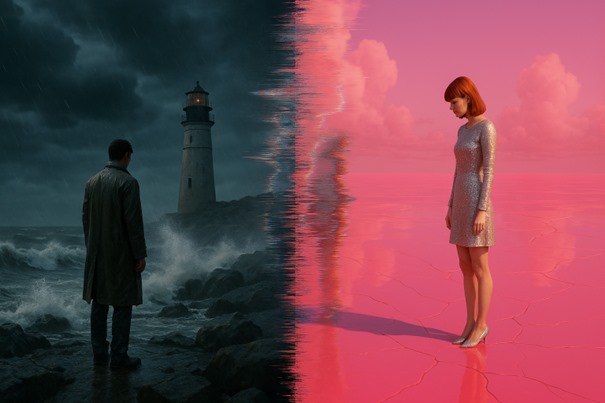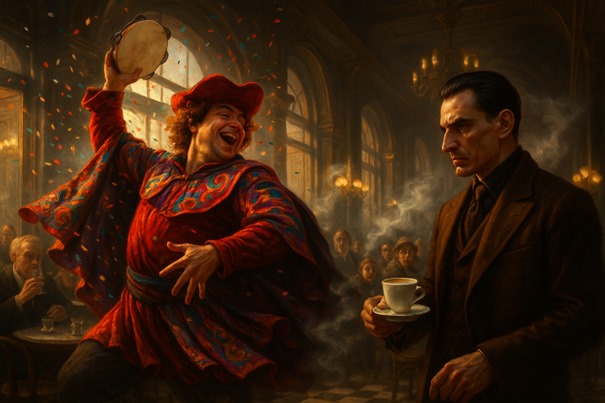One is a psychological thriller drenched in paranoia, trauma, and madness.
The other is a candy-colored comedy about dolls discovering patriarchy.
And yet — Shutter Island (2010) and Barbie (2023) may just be the same film.
At least, spiritually.
One follows a federal marshal haunted by war, guilt, and delusion.
The other follows a plastic icon haunted by cellulite, mortality, and awkward silences.
Both films ask the same fundamental question:
"If your world is fake… what happens when you realize it?"
Welcome to the Illusion
In Shutter Island, Leonardo DiCaprio's Teddy Daniels arrives at Ashecliffe Hospital believing he's chasing a missing patient. But nothing is what it seems. Everyone is suspicious. Time distorts. Memories blur. The island breathes its own logic.
In Barbie, Margot Robbie's Barbie wakes up in her perfect dreamhouse, where every day is sunny and synchronized. But suddenly, her feet go flat. Her thoughts grow dark. Death enters the dream.
Both protagonists live in artificial worlds designed to suppress reality — until cracks appear.
Teddy starts to question his identity.
Barbie starts to question her purpose.
They're not stories about escape.
They're stories about confrontation with the self.
Guilt vs. Meaninglessness
Teddy's descent is rooted in trauma. He's a war veteran, a man broken by personal loss, hiding behind a fictional identity to survive the weight of his sins. His journey through Shutter Island is a forced reckoning — an elaborate therapy session built to make him accept the truth he's running from.
Barbie's descent, in contrast, is rooted not in guilt, but in existential absurdity. She was never meant to think. Never meant to feel. But now she does — and the plastic world of girlboss slogans and convertible dreams can no longer contain her.
Teddy is crushed by memory.
Barbie is unmoored by thought.
But both are victims of a lie — and both must choose whether to live in illusion or face a painful, chaotic truth.
Ken = Chuck? Stay With Me.
Hear me out.
Mark Ruffalo's Chuck, Teddy's partner, is not who he says he is.
Ryan Gosling's Ken, Barbie's accessory, is also not who he thinks he is.
Both characters represent reflections of the protagonist's distorted worldview.
Chuck is actually Teddy's psychiatrist, helping orchestrate his psychological unraveling.
Ken is Barbie's shadow — the side of her reality that becomes unstable when she starts asking questions. He, too, has an identity crisis. He, too, starts to break down.
And both ultimately return to support the main character's transformation — one through quiet loyalty, the other through a dance battle.
Different genres, same archetypes.
A Crisis of Control
Shutter Island explores how power structures create narratives to protect fragile psyches — how even medicine and institutions can be designed to deceive, under the illusion of help.
Barbie explores how corporate systems market identity and sell empowerment — until real autonomy becomes inconvenient.
In both films, the protagonist must decide:
"Do I stay in the structure that feels safe, or risk freedom that feels terrifying?"
Teddy chooses a chilling compromise:
"Which would be worse — to live as a monster, or to die as a good man?"
Barbie chooses rebirth:
"I want to be the one imagining, not the idea imagined."
Different answers — same precipice.
Style vs Substance? No — Style is Substance
On the surface, Shutter Island is grim, masculine, stormy, and cerebral.
Barbie is glittery, comedic, pink, and musical.
But that contrast is part of the brilliance.
Scorsese cloaks his story in noir aesthetics and disorienting camera work.
Greta Gerwig wraps hers in bubblegum visuals and synchronized choreography.
Yet both are psychological odysseys disguised as genre entertainment.
They lure you in with style — and then pull the floor out from under you.
Conclusion: The Dollhouse and the Asylum
In the end, both Shutter Island and Barbie are not about escaping prisons.
They are about realizing that the prisons were always internal.
Whether it's guilt, social conditioning, or an identity manufactured by others, both Teddy and Barbie undergo a metaphysical awakening — and both leave their worlds changed.
So yes, one film ends in a beach of light and choice.
The other ends in institutional silence and ambiguity.
But they both ask us the same thing:
If the world you live in is a lie… do you dare wake up?



